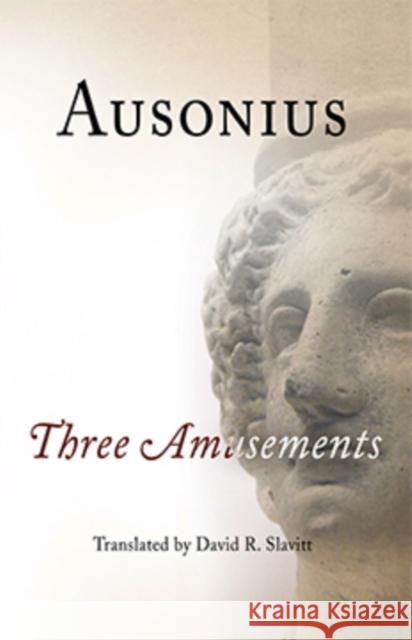Ausonius: Three Amusements » książka
Ausonius: Three Amusements
ISBN-13: 9780812219531 / Angielski / Miękka / 2006 / 100 str.
"Despite the resurgence of interest in the field of late antiquity, there are still too few authors from the period available in translation--and of the few who are translated, most, like Ausonius, are available only in arcane and unreadable English. Ausonius is one of the more accessible late antique writers, and Slavitt's choice of texts to translate reflects his accessibility--the Cento gives us a taste of Ausonius's bizarre sense of humor, and the Commemorations gives us a glimpse into his personal network of friends, teachers, and relatives, and into the everyday life of a wealthy provincial city. Slavitt's translations are simple, direct, often very funny, and sometimes moving. His Cento is a tour de force recreation."--Martha Malamud, editor, Arethusa Ausonius, the most famous of the learned poets active in the second half of the fourth century, was born at Bordeaux and taught school there for 30 years before being summoned to court to teach the future emperor Gratian. He subsequently held important public offices, returning to Bordeaux and private life after Gratian's death in 383. The subjects of many of his poems are typical of the academic world of the time. His Commemorations of the Professors of Bordeaux, a sequence of light verse obituaries of local teachers, in which people are honored--or gossiped about--in their daily occupations, has been called an illustrious poetic precedent to Edgar Lee Masters's Spoon River Anthology. To a literary verse translation of the Commemorations David Slavitt has added versions of Ausonius's Nuptial Cento, assembled from snippets of Shakespeare (Ausonius's original is a pastiche of Virgil), and selected epigrams. "Skill, wit, learning, poetic dexterity, and flabbergasting irreverence--very Ausonian, very amusing and impressive too."--Classical Review David R. Slavitt has published more than sixty books: original poetry, translations (recently Broken Columns, of Statius and Claudian, available from the University of Pennsylvania Press), novels, critical works, and short stories. He worked for seven years as a journalist at Newsweek and continues to do freelance reporting and reviewing. With Palmer Bovie he coedited the Complete Roman Drama in Translation series and the Penn Greek Drama Series. Also of interest: Epinician Odes and Dithyrambs of Bacchylides Translated by David R. Slavitt
"Despite the resurgence of interest in the field of late antiquity, there are still too few authors from the period available in translation--and of the few who are translated, most, like Ausonius, are available only in arcane and unreadable English. Ausonius is one of the more accessible late antique writers, and Slavitts choice of texts to translate reflects his accessibility--the Cento gives us a taste of Ausoniuss bizarre sense of humor, and the Commemorations gives us a glimpse into his personal network of friends, teachers, and relatives, and into the everyday life of a wealthy provincial city. Slavitts translations are simple, direct, often very funny, and sometimes moving. His Cento is a tour de force recreation."--Martha Malamud, editor, ArethusaAusonius, the most famous of the learned poets active in the second half of the fourth century, was born at Bordeaux and taught school there for 30 years before being summoned to court to teach the future emperor Gratian. He subsequently held important public offices, returning to Bordeaux and private life after Gratians death in 383.The subjects of many of his poems are typical of the academic world of the time. His Commemorations of the Professors of Bordeaux, a sequence of light verse obituaries of local teachers, in which people are honored--or gossiped about--in their daily occupations, has been called an illustrious poetic precedent to Edgar Lee Masterss Spoon River Anthology. To a literary verse translation of the Commemorations David Slavitt has added versions of Ausoniuss Nuptial Cento, assembled from snippets of Shakespeare (Ausoniuss original is a pastiche of Virgil), and selected epigrams."Skill, wit, learning, poetic dexterity, and flabbergasting irreverence--very Ausonian, very amusing and impressive too."--Classical ReviewDavid R. Slavitt has published more than sixty books: original poetry, translations (recently Broken Columns, of Statius and Claudian, available from the University of Pennsylvania Press), novels, critical works, and short stories. He worked for seven years as a journalist at Newsweek and continues to do freelance reporting and reviewing. With Palmer Bovie he coedited the Complete Roman Drama in Translation series and the Penn Greek Drama Series.Also of interest:Epinician Odes and Dithyrambs of BacchylidesTranslated by David R. Slavitt











